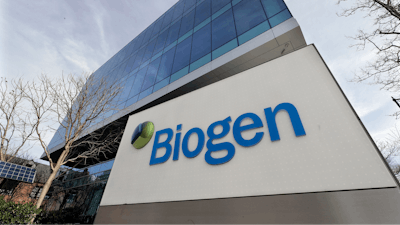
A new Alzheimer’s drug from Biogen brought in only $300,000 in sales during its first full quarter on the market, extending a slow debut complicated by coverage questions and doctor concerns.
The infused drug, hailed as a potential breakthrough treatment for a fatal disease, has encountered a health care system that “remains a major bottleneck” in keeping the treatment from patients, CEO Michel Vounatsos said Wednesday.
The U.S. Food and Drug Administration approved the drug, named Aduhelm, in June and later said it was appropriate for patients with mild symptoms or early-stage Alzheimer’s.
Aduhelm clears brain plaque thought to play a role in Alzheimer’s disease, and regulators made their call based on study results showing the drug seemed likely to benefit patients. But they’ve asked for more research.
Questions about the scientific studies behind Aduhelm and how patients will pay for a drug that can cost more than $50,000 annually have made some care providers cautious.
 This image provided by Biogen on Monday, June 7, 2021 shows a vial and packaging for the drug Aduhelm. The first new Alzheimer’s treatment in more than 20 years was hailed as a breakthrough when regulators approved it in June 2021, but its rollout has been slowed by questions about its price and how well it works.Biogen via AP, File
This image provided by Biogen on Monday, June 7, 2021 shows a vial and packaging for the drug Aduhelm. The first new Alzheimer’s treatment in more than 20 years was hailed as a breakthrough when regulators approved it in June 2021, but its rollout has been slowed by questions about its price and how well it works.Biogen via AP, File
Several major medical centers have yet to decide whether they will use Aduhelm, which represents the first new Alzheimer’s treatment in more than 20 years.
Vounatsos said Wednesday during a call to discuss the company’s third quarter that Biogen is “working to improve the community’s understanding of our clinical data.”
“We continue to believe in Aduhelm’s long-term potential,” he said.
An analyst asked if Biogen leaders have thought about changing the drug’s price. The CEO said that while “fine tuning” the price is always an option, that has not come up as a primary concern in market research.
Biogen, which developed Aduhelm with Japan’s Eisai Co., also emphasizes that it has financial assistance programs for patients who struggle to afford Aduhelm.
A big factor in patient affordability will be whether or how Medicare decides to cover Aduhelm, a decision expected by next April. The federal program for people over age 65 is expected to cover most of the patients who will be eligible for the drug.
Biogen leaders said Wednesday that they expect Aduhelm sales to accelerate after that decision. But even then, they expect use of the drug to grow gradually.
In the meantime, they report progress as treatment centers figure out how to diagnose, treat and then monitor patients on Aduhelm, an undertaking more complex than what is required for other Alzheimer’s treatments.
A total of 120 sites have infused at least one patient, which is more than double what the company counted about six weeks ago.
But it’s also far fewer than the 900 sites the company has said it expected to be ready shortly after U.S. regulators approved the drug.
Other countries and the European Union also are reviewing the drug.
Aduhelm has generated about $2 million in sales so far this year. Company officials attributed the $300,000 recorded for the third quarter in part to drug wholesalers drawing down inventory they had purchased the previous quarter.
Analysts who follow Biogen had been expecting as much as $16 million or $17 million in Aduhelm sales for the quarter, Mizuho Securities USA analyst Salim Syed said, adding that investors anticipated a much lower figure.
Biogen expects Aduhelm to have a minimal impact on its performance in 2021. The drugmaker raised its annual revenue and profit forecasts for the year on Wednesday after reporting a better-than-expected third quarter.
Biogen, which also makes the multiple sclerosis treatment Tecfidera, now expects adjusted earnings of $18.85 to $19.35 per share on $10.8 billion to $10.9 billion in revenue.
Analysts expect earnings of $18.49 per share on $10.74 billion in revenue, according to FactSet.
Shares of Cambridge, Massachusetts-based Biogen Inc. slipped 65 cents to $267.48 Wednesday afternoon, while broader indexes rose slightly.
The stock price had soared about 45% and climbed past $400 after Aduhelm received FDA approval in June. But the shares have since shed most of that gain.






















